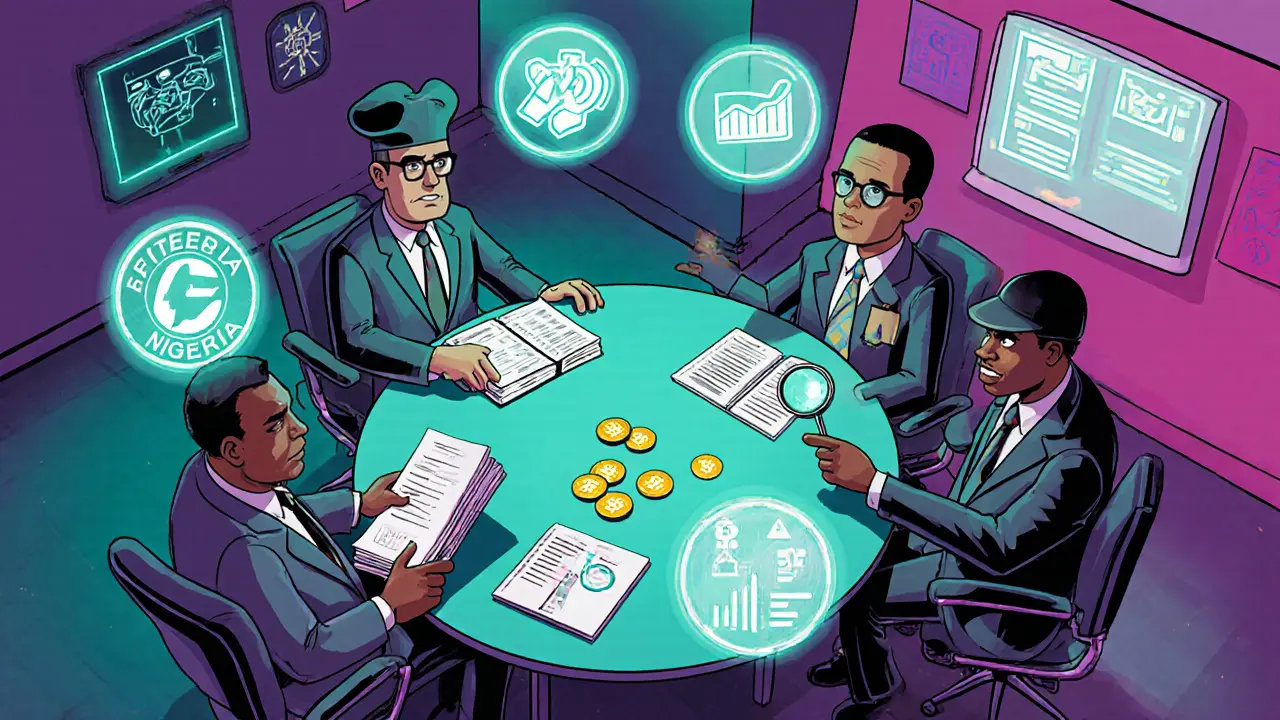Nigeria Cryptocurrency Regulation 2025: Legal Status Explained

Jul, 25 2025
Nigeria Crypto Tax Calculator
Calculate Your Crypto Tax
Determine your capital gains tax liability according to Nigeria's 2025 tax regulations.
Tax Calculation Results
According to Nigeria's NTAA 2025, capital gains on cryptocurrency are taxed at rates between 10% and 30% based on individual income. This calculator uses a default 10% rate. For accurate filing, always consult the Federal Inland Revenue Service (FIRS) and keep detailed transaction records.
Cryptocurrency in Nigeria is a digital asset that Nigerians can buy, sell, or hold for investment, but it is not legal tender. The landscape changed dramatically in 2025 when President Bola Ahmed Tinubu signed the Investments and Securities Act 2025 (ISA 2025) into law. The new framework treats most crypto assets as securities, gives the Securities and Exchange Commission (SEC) broad oversight powers, and introduces a tax regime under the Nigeria Tax Administration Act 2025 (NTAA 2025). Below is a plain‑English walk‑through of what you need to know.
Why the legal status matters to you
If you’re buying Bitcoin on a peer‑to‑peer platform, trading NFTs, or running a crypto exchange, the rules dictate whether you can operate openly, what you owe the tax office, and how safe your funds are. Before the 2025 reforms, the environment was a patchwork of bans, sandbox pilots, and ad‑hoc circulars. Today, a clear set of rules governs licensing, taxation, and consumer protection.
Timeline: From a ban to a regulated market
- Feb 2021 - The Central Bank of Nigeria (CBN) bans banks from processing crypto transactions, pushing activity to informal P2P channels.
- 2023 - CBN relaxes its stance, allowing banks to hold accounts for licensed Virtual Asset Service Providers (VASPs).
- June 2024 - The SEC launches the Accelerated Regulatory Incubation Programme (ARIP), a sandbox for testing crypto services.
- Mar 25 2025 - ISA 2025 is enacted, officially recognizing digital assets as securities.
- June 2025 - NTAA 2025 introduces a dedicated crypto tax framework, effective 2026.
Key provisions of the Investments and Securities Act 2025
- Definition of crypto asset: "a digital representation of value that can be transferred, digitally traded and used for payment or investment purposes." Digital versions of fiat money are excluded.
- SEC’s authority: The SEC can register, monitor, audit, and penalise any crypto exchange or VASP. It can also suspend executives and revoke licences.
- Licensing requirement: All crypto exchanges and VASPs must obtain a licence from the SEC. Early licences were granted to Quidax and Busha, but the vetting process can be lengthy. \n
- Consumer protection: Ponzi schemes are explicitly banned, and the SEC can access telecom records to investigate fraud.
- Scope of regulation: Investment‑focused NFTs and online forex platforms fall under the Act, while purely artistic NFTs are exempt.
Who does what? The multi‑agency oversight model
ISA 2025 creates a coordinated system involving four key bodies:
| Agency | Primary Responsibility | Key Powers |
|---|---|---|
| SEC | Regulate securities markets, including crypto assets | Licensing, audits, penalties, executive removal |
| CBN | Monetary policy and banking regulation | Control over bank‑crypto interactions, AML oversight |
| EFCC | Economic and financial crimes enforcement | Investigate fraud, seize illicit assets |
| NFIU | Financial intelligence and AML/CFT compliance | Monitor VASP transactions, issue compliance directives |

Licensing your crypto business: Step‑by‑step
- Prepare a detailed business plan outlining the services you intend to provide (exchange, wallet, DeFi, etc.).
- Submit the application to the SEC through the online portal, attaching proof of capital, AML policies, and technology audit reports.
- The SEC conducts a thorough vetting, which includes background checks on founders and a review of smart‑contract code where applicable.
- If approved, you receive a licence valid for three years, renewable upon compliance review.
- Maintain ongoing reporting: monthly transaction volumes, AML/KYC metrics, and any changes to governance structures.
Missing any of these steps can trigger a ₦10 million penalty (≈$6,700) in the first month, with additional ₦1 million charges per month of delay, as per NTAA 2025.
Taxation under the Nigeria Tax Administration Act 2025
The NTAA 2025 treats crypto gains as taxable income. Here’s what you need to file:
- For individual investors: Capital gains on crypto disposals are taxed at the applicable personal income tax rates (10‑30 %).
- For VASPs: Must withhold tax on user earnings, submit quarterly tax returns, and remit a minimum ₦10 million in the first month of operation.
- Reporting: All crypto transactions above ₦500,000 must be reported to the Federal Inland Revenue Service (FIRS) via the electronic filing system.
Non‑compliance can lead to licence suspension by the SEC, plus the hefty penalties mentioned earlier.
Practical implications for everyday users
What does all this mean for you?
- Buying & selling: Use SEC‑licensed exchanges (e.g., Quidax, Busha) for a safer experience. Unlicensed platforms expose you to fraud and potential legal risk.
- Payments: Crypto still cannot replace the naira for official transactions-think of it as an investment asset, not a currency.
- Tax filing: Keep records of purchase dates, amounts, and disposal values. Your wallet app should generate a CSV you can upload to the tax portal.
- Security: The new law gives the SEC power to shut down fraudulent sites quickly, but you still need strong personal security-hardware wallets, two‑factor authentication, and avoiding phishing links.

Comparison: Pre‑ISA 2025 vs Post‑ISA 2025
| Aspect | Before ISA 2025 | After ISA 2025 |
|---|---|---|
| Legal status | Unclear, subject to CBN ban | Recognized as securities |
| Licensing | None required; most operated informally | SEC licence mandatory for exchanges/VASPs |
| Taxation | No specific crypto tax | NTAA 2025 imposes tax on gains and VASP revenues |
| Consumer protection | Limited; fraud rampant | SEC can ban Ponzi schemes, access telecom data |
| Agency coordination | Fragmented, CBN dominant | SEC, CBN, EFCC, NFIU work jointly |
Checklist: Are you compliant?
- Are you using a SEC‑licensed exchange or VASP?
- Do you keep detailed transaction records for tax reporting?
- Have you implemented AML/KYC procedures if you run a platform?
- Is your crypto activity reported to the FIRS when thresholds are exceeded?
- Do you stay updated on SEC circulars and CBN guidance?
If you answered "no" to any of these, it’s time to adjust before the 2026 tax implementation kicks in.
Future outlook: What’s next for Nigerian crypto?
Observers see Nigeria’s model as a potential blueprint for other African economies. The multi‑agency approach balances innovation with consumer safeguards. Expect:
- More SEC‑approved fintech platforms integrating crypto wallets.
- Potential expansion of the licence regime to cover decentralized finance protocols that meet AML standards.
- Continued collaboration with regional bodies like the African Development Bank to harmonise cross‑border crypto regulations.
In short, the sector is moving from a wild west into a regulated market-good news for investors who like certainty.
Is cryptocurrency illegal in Nigeria?
No. Crypto is not illegal, but it is not recognised as legal tender. You can trade and invest, provided you use a SEC‑licensed platform.
Do I need to pay tax on crypto gains?
Yes. Under the NTAA 2025, crypto gains are taxable. Individuals pay personal income tax rates, while VASPs must file quarterly returns and may face hefty penalties for non‑compliance.
Which exchanges are legally allowed to operate?
Only exchanges that have received a licence from the SEC. Quidax and Busha were among the first approved, but the SEC continues to evaluate new applicants.
Can I use crypto to pay for goods and services?
Only if the merchant voluntarily accepts it. Crypto cannot be used for official tax payments, salaries, or any transaction that requires the naira.
What happens if I trade on an unlicensed platform?
You risk losing your funds to fraud and could face legal scrutiny if the platform is deemed to be operating illegally under ISA 2025.